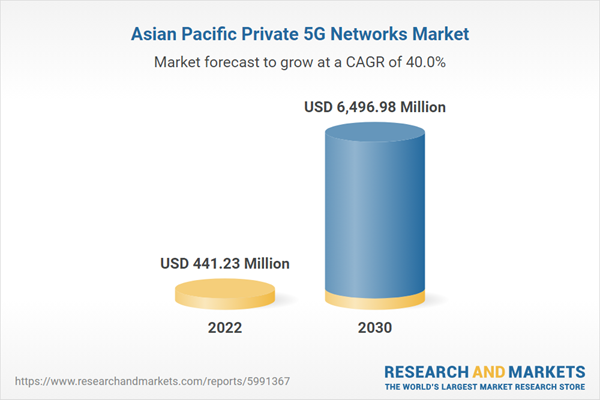Increasing Deployment of Time-Sensitive Networking in Automotive Industries Boosts Asia Pacific Private 5G Networks Market
Time-sensitive networking (TSN) is a set of protocols for predictable, low-latency communication across Ethernet networks. As a result, it is suited for use in applications requiring real-time communication, such as autonomous driving and advanced driver assistance systems (ADAS). For automotive applications, private 5G networks have certain advantages over standard public cellular networks. They can offer more bandwidth, lower latency, and more reliability. This is due to the fact that private 5G networks are dedicated to a particular user or organization and do not have the same congestion difficulties as public networks.The combination of TSN and private 5G networks is creating new opportunities for the automotive industry. For example, TSN can be used to enable real-time communication between various sensors, actuators, and control systems in an autonomous vehicle. This is crucial for ensuring the safety and reliability of autonomous driving systems. TSN technologies are emerging. For instance, the IEEE Standards Association advances new TSN application profiles as adoption increases in the automotive industry. Therefore, the growing interest in TSN in the automotive industry is an opportunity for growth in the private 5G network market. As the automotive industry continues to develop and deploy autonomous vehicles and ADAS systems, the demand for private 5G networks is expected to continue to grow.
Asia Pacific Private 5G Networks Market Overview
Asia Pacific is home to some of the world's largest and most innovative economies, and many enterprises in the region are already looking to adopt private 5G networks to improve their operational efficiency and productivity. For example, in China, a number of leading manufacturers, such as Huawei and ZTE, are using private 5G networks to implement smart manufacturing solutions. In South Korea, Samsung Electronics. Co. Ltd. and SK Telecom announced that the two companies successfully developed and trialed the next-generation 5G core network.Both companies intend to identify new 5G use cases by enhancing their ability to effectively install, provision, and activate new apps. With private 5G networks, Samsung and SKT are developing advanced network capabilities to enable the delivery of these new immersive capabilities to consumers and increase the accessibility and deployment ease of 5G for enterprises. Moreover, governments in Asia Pacific are playing an important role in promoting the deployment of private 5G networks. For example, the Indian government has launched a number of initiatives to support the development of a private 5G ecosystem in the country. The Japanese government has also allocated a significant amount of funding to support the deployment of private 5G networks in the country. Therefore, the private 5G network market in Asia Pacific is expected to witness significant growth in the coming years, driven by a number of factors, including the rising demand for high-speed and reliable connectivity from enterprises, growing government support, and the increasing maturity of the 5G ecosystem.
Asia Pacific Private 5G Networks Market Revenue and Forecast to 2030 (US$ Million)
Asia Pacific Private 5G Networks Market Segmentation
The Asia Pacific private 5G networks market is segmented based on component, frequency, end user, and country. Based on component, the Asia Pacific private 5G networks market is categorized into hardware, software, and services. The hardware segment held the largest market share in 2022.Based on frequency, the Asia Pacific private 5G networks market is bifurcated into sub-6GHz and mmwave. The sub-6GHz segment held a larger market share in 2022.
Based on end user, the Asia Pacific private 5G networks market is categorized into manufacturing, energy and utilities, automotive, military and defense, government and public safety, and others. The manufacturing segment held the largest market share in 2022.
Based on country, the Asia Pacific private 5G networks market is segmented into China, Japan, South Korea, Australia, India, and the Rest of Asia Pacific. China dominated the Asia Pacific private 5G networks market share in 2022.
Cisco Systems Inc, Huawei Technologies Co Ltd, Nokia Corp, Telefonaktiebolaget LM Ericsson, T-Systems International GmbH, Verizon Communications Inc, Vodafone Group Plc, AT&T, Qualcomm Inc, and Amazon Web Services Inc are some of the leading companies operating in the Asia Pacific private 5G networks market.
Reasons to Buy:
- Save and reduce time carrying out entry-level research by identifying the growth, size, leading players, and segments in the Asia Pacific private 5G networks market.
- Highlights key business priorities in order to assist companies to realign their business strategies.
- The key findings and recommendations highlight crucial progressive industry trends in the Asia Pacific private 5G networks market, thereby allowing players across the value chain to develop effective long-term strategies.
- Develop/modify business expansion plans by using substantial growth offering developed and emerging markets.
- Scrutinize in-depth Asia Pacific market trends and outlook coupled with the factors driving the Asia Pacific private 5G networks market, as well as those hindering it.
- Enhance the decision-making process by understanding the strategies that underpin commercial interest with respect to client products, segmentation, pricing, and distribution.
Table of Contents
Companies Mentioned
- Cisco Systems Inc
- Huawei Technologies Co Ltd
- Nokia Corp
- Telefonaktiebolaget LM Ericsson
- T-Systems International GmbH
- Verizon Communications Inc
- Vodafone Group Plc
- AT & T
- Qualcomm Inc
- Amazon Web Services Inc
Table Information
| Report Attribute | Details |
|---|---|
| No. of Pages | 108 |
| Published | June 2024 |
| Forecast Period | 2022 - 2030 |
| Estimated Market Value ( USD | $ 441.23 Million |
| Forecasted Market Value ( USD | $ 6496.98 Million |
| Compound Annual Growth Rate | 40.0% |
| Regions Covered | Asia Pacific |
| No. of Companies Mentioned | 10 |









